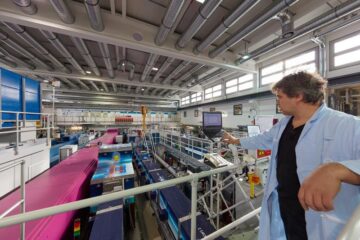RODental – Removable adhesion material for dental applications

RODental is a dentistry cement containing encapsulated phase-change material. This novel type of cement allows a removal of permanent and provisionally fixed dental restorations when needed (remove on demand) – without destroying or damaging these. Because properties of RODental can be triggered by temperature, all ceramic restorations, e. g. crowns, brackets or bridges on implants or teeth, can be mechanically removed in an easy way.
Challenge: Mainly there are three applications, for which new adhesive material is required: 1. Until today, dental cement used to cement fixed restorations on teeth or implants is optimized for permanent fixation. In case of clinical or technical complications, e. g. screw loosening on implants, parodontitis or ceramic chipping, a necessary removal of the restoration leads to destruction or damage. Re-use of the restoration is rarely possible, thus removing so far regularly requires a new preparation, combined with additional expenses. 2. In case of provisional fixation of long time provisional restorations stability over a certain period of time is a desirable feature. Cements currently available are not stable over time. Restorations may fall off at any time and may even be aspirated or swallowed by the patient. 3. To date orthodontic brackets have to be removed with special nippers and the adhesive cement remaining on the tooth structure has to be removed with diamond or hard metal burs. This procedure is time consuming. In addition it bears the risk of damaging the tooth structure.
Weitere Informationen: PDF
PROvendis GmbH
Tel.: +49 (0)208/94105 10
Ansprechpartner
Dipl.-Ing. Alfred Schillert
Media Contact
Alle Nachrichten aus der Kategorie: Technologieangebote
Neueste Beiträge

Bakterien für klimaneutrale Chemikalien der Zukunft
Forschende an der ETH Zürich haben Bakterien im Labor so herangezüchtet, dass sie Methanol effizient verwerten können. Jetzt lässt sich der Stoffwechsel dieser Bakterien anzapfen, um wertvolle Produkte herzustellen, die…

Batterien: Heute die Materialien von morgen modellieren
Welche Faktoren bestimmen, wie schnell sich eine Batterie laden lässt? Dieser und weiteren Fragen gehen Forschende am Karlsruher Institut für Technologie (KIT) mit computergestützten Simulationen nach. Mikrostrukturmodelle tragen dazu bei,…

Porosität von Sedimentgestein mit Neutronen untersucht
Forschung am FRM II zu geologischen Lagerstätten. Dauerhafte unterirdische Lagerung von CO2 Poren so klein wie Bakterien Porenmessung mit Neutronen auf den Nanometer genau Ob Sedimentgesteine fossile Kohlenwasserstoffe speichern können…

















